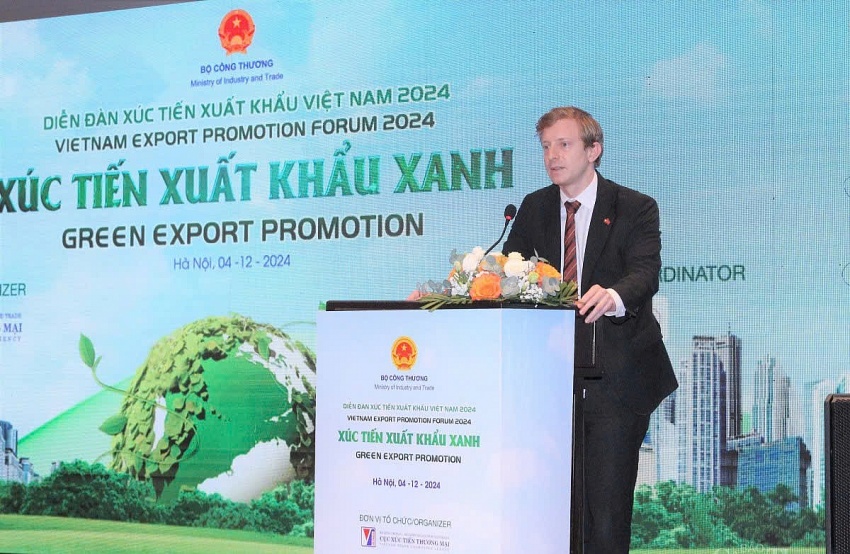Vietnam Export Promotion Forum discusses sustainable trade
 |
| Andri Meier, deputy head of Development Cooperation at the Swiss Embassy in Vietnam. Photo: Ministry of Industry and Trade |
The 2024 Vietnam Export Promotion Forum was held in Hanoi on December 4. Speaking at the event, Andri Meier, deputy head of Development Cooperation at the Swiss Embassy in Vietnam, said, "Governments, businesses, and the public are prioritising products and services that align with social and environmental sustainability. Vietnam needs to focus on strengthening the capacity of its business community to achieve sustainable growth in line with such demands."
Green and sustainable development allows industries to enhance export value, protect the environment, and contribute to raising the country’s position in the global value chain.
This is seen as a strategic move for Vietnam to strengthen its position in the global value chain while fostering sustainable economic growth, reducing negative environmental impacts, and enhancing the overall competitiveness of its economy.
Vietnam is being directly affected by key policies such as the European Green Deal, the Carbon Border Adjustment Mechanism, and the Circular Economy Action Plan as they are significantly reshaping global growth, economic cooperation, trade, and investment patterns.
Additionally, the demand for green and environmentally friendly products is steadily increasing, especially as Vietnam deepens its integration into new-generation Free Trade Agreements (FTAs), such as the EU-Vietnam Free Trade Agreement and the Comprehensive and Progressive Agreement for Trans-Pacific Partnership. These agreements come with binding commitments on environmental protection, including biodiversity preservation and emission reduction.
According to Nguyen Ba Hung, chief economist at the Asian Development Bank, "Vietnam’s emissions have been on an upward trend over the past two decades, reflecting the country’s industrialisation process. While GDP has grown rapidly, emissions per unit of GDP have also risen, contrasting with the declining trend observed in other regional countries."
"If the issue is not promptly addressed, it will undermine the competitiveness of export goods," added Hung.
Vietnam's total trade volume is expected to reach nearly $800 billion by the end of this year, with exports estimated at $380–390 billion. The target of $1 trillion in trade is within reach as the country continues to draw in foreign investment from various countries looking to establish production hubs here.
Alongside rapid growth in production and trade, businesses must accelerate preparations to ensure their export goods meet the stringent regulations of importing countries.
This entails investing in sustainable development, prioritising technological advancements, transitioning to cleaner energy sources, reducing dependence on natural resources, minimising pollution and waste, and curbing emissions throughout production processes.
Adopting green and sustainable production strategies offers significant advantages for businesses. It helps enhance competitiveness and improve the marketability of their products. Yet, many firms are grappling with resource constraints as they strive to adapt to the rigorous standards set by global buyers.
Regarding this issue, Hung said, "To secure green financing for sustainable development, businesses can access green funding from domestic and international organisations or through bond issuance."
A commitment to supporting Vietnam in sustainable economic development was also proclaimed by representatives of the Swiss Embassy.
"We are preparing a framework for economic development cooperation with Vietnam for the 2025–2028 period. This initiative, set to launch at the end of 2025, aims to assist Vietnam on its path towards becoming a high-income economy with enhanced resilience," said Meier.
What the stars mean:
★ Poor ★ ★ Promising ★★★ Good ★★★★ Very good ★★★★★ Exceptional
 Tag:
Tag:
Related Contents
Latest News
More News
- Agro-forestry and fisheries exports jump nearly 30 per cent in January (February 09, 2026 | 17:45)
- Canada trade minister to visit Vietnam and Singapore (February 09, 2026 | 17:37)
- New tax incentives to benefit startups and SMEs (February 09, 2026 | 17:27)
- Vietnam forest protection initiative launched (February 07, 2026 | 09:00)
- China buys $1.5bn of Vietnam farm produce in early 2026 (February 06, 2026 | 20:00)
- Vietnam-South Africa strategic partnership boosts business links (February 06, 2026 | 13:28)
- Mondelez Kinh Do renews the spirit of togetherness (February 06, 2026 | 09:35)
- Seafood exports rise in January (February 05, 2026 | 17:31)
- Accelerating digitalisation of air traffic services in Vietnam (February 05, 2026 | 17:30)
- Ekko raises $4.2 million to improve employee retention and financial wellbeing (February 05, 2026 | 17:28)






















 Mobile Version
Mobile Version